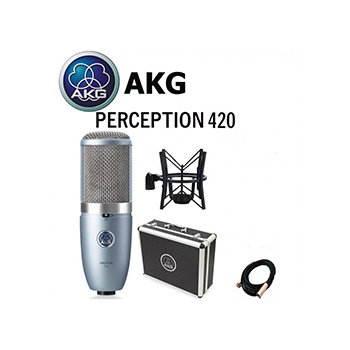
The AKG Perception 420 Studio Condenser Microphone features legendary AKG sound
quality and a dual-element design that accommodates cardioid, omni, and figure-8 patterns.
The Perception 420 includes a shock mount and a metal case, and is equipped with a -20dB pad switch
and a bass cut filter switch that allows easy removal of wind noise and other unwanted low frequencies.
The AKG Perception 420 Studio
Condenser Microphone is a new addition to the acclaimed Perception line of AKG microphones.
With the pad switched in, the 420 can handle SPLs up to 155dB, so there's not much that's likely to challenge
it in the volume department. Apparently, the design brief was to offer a warm but transparent sound quality,
and the manufacturer's listed applications include grand piano, woodwind, brass, drums
and percussion (although they make no mention of vocals). The frequency range is quoted simply as 20Hz to 20kHz,
which doesn't give much away about mic's voicing — or even about its true frequency response, because no 'dBs down'
limits are specified. Fortunately, though, a response curve in the manual is more helpful, showing a reasonably flat
response for all three patterns, although the shape and position of the modest presence peak differs for each, as you'd expect.
Its sensitivity is 28mV/Pa ( 31dBV) with an A weighted signal to noise ratio of 78dB, so its performance seems to be comparable
with other well designed mics of a similar type at this price point. Overall, the mic measures 53 x 165 mm and weighs 525g (18.5 ounces),
giving it a substantial feel without making it so heavy as to cause the mic stand to sag.
Although not put forward primarily as a vocal mic, there's no reason not to use the 420 for
that purpose as long as you're after a fairly neutral sound — most dedicated vocal mics will have
a more pronounced presence peak. The mic's resistance to popping is better than average, although
a pop shield should always be used when recording vocals, and the general tonal character remains sensibly
consistent between the three patterns.
There's the inevitable switching click when you change patterns, but the circuitry settles down almost immediately.
As an instrument mic, the 420 comes over as well balanced and solid, handling high end detail smoothly without
over hyping it or making everything sound too forward. It works well on acoustic guitar, producing a rich,
homogenous sound that balances warmth with detail, again without making the highs seem brittle or forced.
Admittedly, there are plenty of mics that will do the job equally well, but given its build quality, price
and design provenance, the Perception 420 is a great all rounder, and at no time did background noise become
evident, despite its very average spec in this department. The shockmount is also worthy of mention because
it seems a bit better thought out than many of the 'me too' designs, and it holds the mic very securely.
